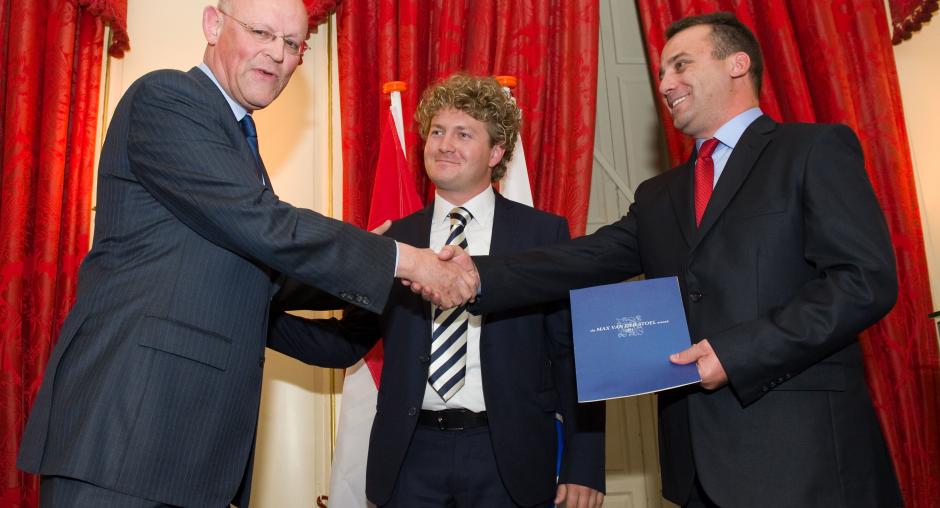"Integration at the grass-roots" – the Nansen Dialogue Centre Skopje three years on
When Nansen Dialogue Centre Skopje (NDC Skopje) in 2011 became the fifth winner of the Max van der Stoel Award, the jury noted that it had “taken up the challenging task of bringing together students, parents and teachers in an area that has been affected by the 2001 conflict and is characterized by great ethnic divisions.” Its integrated bilingual schools are models for promoting respect for diversity, bilingualism and harmonious relations between teachers, pupils and their parents from different ethnic backgrounds.
Three years on NDC Skopje’s Executive Director Sasho Stojkovski, Project Manager Veton Zekolli and Training Centre Manager Biljana Krsteska-Papic say that the separation of society along ethnic lines has continued to widen. This is especially so in schools, they say, where the next generation are being brought up in mono-ethnic environments where stereotypes and prejudice thrive.
Divided society
Stojkovski says that one of the main challenges has been a lack of sustained government commitment at the central level. “Since 2008, there have been no changes at the political or governmental level regarding integrated education. In six years, there have been four Education Ministers.”
Zekolli adds that a lack of political will to overcome the separation is felt at all levels of society. “We live in a highly politicized society and politics easily dominates the environment in schools and neighbourhoods. Most inter-ethnic incidents start in multi-ethnic schools. Some are fabricated and others are not, but the effect is the same: parents are choosing to send their children to mono-ethnic schools because the authorities are passive.”
Of the few inter-ethnic schools that do exist, they exist only in name because in reality pupils from different communities are often segregated, notes Krsteska-Papic. She points to examples where one school can have “two managements, two names, two separate buildings, or even one school building with two or three ethnic shifts, separated and divided physically on different floors within the same facility.”
Integration in our schools is celebrating birthdays together, spending every day together, working on different project ideas together, organizing school performances together, spending lunch time together, and introducing the school to the parents and the community.
Veton Zekolli, NDC Skopje's Project Manager
One of the consequences of thorough ethnic separation in schools is inter-ethnic tension.
“The lack of communication, co-operation and integration between the students from different ethnic backgrounds leads towards stereotypes and prejudices, which will result in hatred and incidents on the streets,” Zekolli explains.
“Integration is not a two-day seminar or a field trip,” he says, stressing the need for more long-term solutions. “Integration in our schools is celebrating birthdays together, spending every day together, working on different project ideas together, organizing school performances together, spending lunch time together, and introducing the school to the parents and the community.”
Stojkovski laments that the reconciliation process was understood simply as the “rebuilding of damaged properties and goods, and nurturing of the displaced persons.” He adds that while the Ohrid Framework Agreement was considered a solution to all the issues and consequences of the conflict, no real efforts were made to rebuild the bridges between communities that had been affected by the war. “Not enough efforts are being made towards dialogue.”
Communities search for solutions
In contrast to the political level, Stojkovski says that communities are searching for solutions at the grass-roots level, with initiatives to introduce integrated education in new schools now coming from teachers and school directors who have heard about integrated education. “They contact us, inform the mayors and set up new collaboration initiatives between the municipality and the school.”
NDC Skopje is also expanding. Currently operating seven schools in six municipalities, this month it is opening six new schools in an additional three municipalities. It is also training more teachers to provide integrated education.
Stojkovski hopes that with NDC Skopje branching into more schools, they will get more attention, not only at the grass-roots level but also at the government level. “We hope the authorities will see that our schools are supported by the students, teachers, parents and mayors, and that they demonstrate results.”
Winning the Max van der Stoel Award brought international and local attention to NDC Skopje’s mission and work. “It also boosted morale among staff who have faced strong opposition in the past,” says Zekolli. “There were many sceptics and groups that did not believe in our work, but the Award proved them wrong.”

